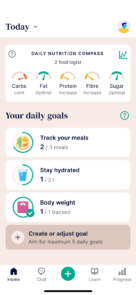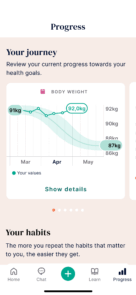
5 ways to stick to a diet (from a health psychologist)
Many find it hard to stick to a diet – and that’s completely normal. Life gets busy, expectations can feel overwhelming, and quick fixes often fall short.
But long-term change is possible with the right support and small, sustainable habits. Instead of focusing on strict rules or fast results, we encourage a kinder, more realistic approach that fits into your life. If you’re ready to make changes that last, you don’t have to do it alone – you could be eligible for expert, NHS-funded weight loss support from Oviva.
Key Takeaways
- Diets are often viewed as quick fixes, whereas changing your behaviour around food, exercise and lifestyle is for long-term results.
- Set realistic expectations and ensure your goals are based on behaviour you can fully control rather than weight and numbers on a scale
- Avoid skipping meals and unsustainable diets that promise rapid weight loss (unless supervised by professionals).
- Professional support can help you create a personlised weight loss plan that’s designed to work for you. To find out more, speakto your GP about Oviva.
Why can it be hard to stick to a diet?
If you’re trying to lose weight, dieting can be challenging, and many people struggle with figuring out how to stick to a diet for the long term. There are several reasons for this, including:
1. Unrealistic expectations
One of the biggest reasons people bounce off of diets is because they set unrealistic expectations about how much weight they will lose. For example, if you set a high weight loss target per month, even if you achieve it for the first month or two, it’s easy to become disillusioned if you do not experience the same results in the following months.
The internet is full of unrealistic claims about how much weight people can lose in a month by following specific diets, which can make it challenging to understand what realistic progress looks like. The NHS recommends aiming for a weight loss of around 1-2 lbs (0.5-1 kg) per week, which is up to 10 lbs (4.5 kg) per month. However, even this needs to be viewed as a generalisation that may not apply to everyone.
2. Too many ‘shoulds’
Another common pitfall is setting too many concrete rules for yourself about what you should be doing and the weight loss you should be achieving.
When you create too many ‘shoulds’, it’s easy to become overly self-critical if you fall short of these ideals. This, in turn, can mean minor deviations turn into more major breaks from your plan because you feel like you’ve failed at the diet.

3. Skipping meals
When you’re trying to lose weight, it’s tempting to skip meals like breakfast or lunch to reduce your overall calorie intake. However, this usually becomes counterproductive and can even lead to overeating in the long run.
Skipping meals leads to both psychological and physical hunger. When you do finally eat, you may lose control and overindulge. Think of it like holding your breath. You can only do it for so long before your body takes over because it needs oxygen. The same applies to food.
By skipping main meals, you also often lower the overall quality of your diet. Your body may lack essential nutrients, which can encourage overeating to compensate.
4. Lack of support
Losing weight is challenging, and you’ll need support along the way. This could be community support offered by friends, family, or a weight loss group, or professional support offered by dietitians, doctors, and other healthcare professionals.
Oviva’s weight management programme offers access to a real-life coaching team, which provides advice and support tailored to your specific needs and circumstances. You can also access support from healthcare experts and track your progress.
5. Mindset and mental health
It’s important to stress that weight is just one component of your overall health, and your mindset and mental health can make it challenging to stick to a diet. Regarding mindset, it’s essential to build positive habits and demonstrate self-compassion.
Research (Blasco et al.) shows the link between obesity and mental health goes both ways. Depression is a risk factor for obesity, and people living with obesity are more likely to become depressed. These links provide another reason why professional support can be so valuable.

Tips for sticking to a diet
The following five tips can help you to stick to a diet and avoid rebound weight gain:
1. Think in terms of behaviour change, not dieting
The first and most crucial step to sticking to a diet is to stop thinking about dieting in the classic sense. Instead, try to frame your efforts as behaviour change and forming healthy habits.
People tend to think of dieting as a short-term fix, and you’re either on or off the diet. Instead, it’s better to frame your weight loss efforts as long-term behavioural change, with a degree of flexibility built in but with a need for consistency.
2. Try to stick to a regular meal schedule
Avoid the temptation to skip meals and eat breakfast, lunch, and dinner as much as possible. Most of your food should come from your main meals, as it’s easier to make meals nutritionally balanced than to balance snacks.
You can include snacks within your weight loss plan, but try to stick to healthy snacks as much as possible. A handful of unsalted nuts or a piece of fruit gives your body more of what it needs, rather than crisps, chocolate, or ice cream, because these unhealthy snacks contain empty calories.
3. Make sensible food and drink substitutions
Adapting your diet is a process, and completely eliminating things you’re used to eating can be daunting. Instead, consider whether you can make some sensible substitutions. Where possible, opt for whole foods instead of ultra-processed foods.
For instance, rather than saying you’ll stop eating bread, switch to whole-grain bread. If you usually drink a lot of fizzy drinks, consider ‘diet’ or ‘zero-sugar’ options and start by cutting down on fizzy drinks rather than eliminating them completely.
Also, it’s helpful to continue eating the foods you enjoy, including the less healthy ones, but to reduce the amount you’re eating or how often you have those foods. That way, you won’t feel deprived or reinforce unhelpful food rules you may have about ‘good’ and ‘bad’ food. These rules can psychologically sabotage changes to healthier eating.
4. Be kind to yourself and celebrate success
Next, it’s important to try to be kind to yourself throughout your weight loss journey. Losing weight is difficult, and you should anticipate challenges. If you drift from the plan, try to focus on picking yourself back up and trying again immediately, rather than beating yourself up or viewing a single transgression as a ‘failure’.
Weight loss is a process. The journey is not linear. It’s about the compounding effect of the sustainable changes you’re making toward long-term weight management and well-being.
Every step you take on this journey counts. Making changes takes time, and it’s natural to encounter obstacles along the way. Rather than aiming for perfection, focus on building habits that feel right for you. Celebrate small victories, be patient with yourself, and keep in mind that sustainable change is about progress, not a finish line. Your health journey is yours to own, and every effort you make matters.
Dr Victoria Lawson, Global Clinical Lead for Psychology at Oviva

5. Seek out help and support from experts
Managing your weight involves several complexities. You should also be sceptical about the many weight loss myths you see on social media and seek support from experts like the NHS and healthcare professionals at Oviva.
Professional support can help you manage the emotional and physical challenges of weight loss, and you may also be able to access weight loss injections on the NHS.
Oviva patient success stories:

 -22kg
-22kg
Heidi (53)

 -25kg
-25kg
Martin (34)

 -32kg
-32kg
Patricia (53)
Make lasting changes by setting goals based on behaviours, not weight loss
The best way to make lasting changes is to set goals based on behaviour, not weight loss. Why?
- Increase control: Unlike weight, which can fluctuate due to factors beyond our control – including hormones, water retention, metabolism and unplanned eating – behaviour goals are directly actionable.For example, setting goals to “add vegetables to my dinner” or “go for a walk three times a week” makes room for consistent, achievable actions that don’t depend on external factors, giving a greater sense of accomplishment.
- Form habits: By focusing on behaviours, individuals build habits that support health in the long term. Weight can take time to respond to lifestyle changes.Regular behaviours like keeping a food diary, meal planning, portion control, and consistent movement gradually become part of a person’s routine. Over time, these behaviours are more likely to lead to sustainable weight loss without the pressure of immediate results.
- Reduce stress and pressure: Weight-centred goals can lead to stress, especially if progress is slow or inconsistent. This can trigger feelings of failure or “all-or-nothing” thinking, where setbacks might cause someone to abandon their efforts entirely.Behaviour goals shift the focus to daily actions, reducing the pressure and encouraging a positive mindset centred on small, consistent changes.
- Gain health benefits beyond weight: Behavioural goals encourage actions that improve overall health, not just weight. For instance, eating more fibre or reducing sugary drinks benefits cardiovascular health, digestion, and energy levels, regardless of changes to your body weight. This approach promotes a holistic view of health, emphasising overall well-being instead of a specific number on the scale.
- Achieve long-term success: People who focus on healthy behaviours rather than just weight loss tend to maintain their results longer. They’re developing skills and habits that support their health goals even when life circumstances change, making them more resilient to setbacks and unexpected events.

Supporting your sustainable weight loss journey
Oviva is accredited by the NHS to provide weight management services, complete with prescription weight loss injections. Our team of healthcare professionals includes dietitians, psychologists, doctors and more.
You may be eligible for the Oviva programme if you have a BMI over 35 (27.5 for people from ethnic minority family backgrounds) and at least one weight-related health condition. Speak to your GP, and you could gain access to personalised care and treatments like Wegovy.








